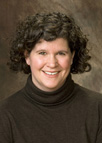Professors want more females in science field
February 4, 2014
Noticing a lack of female interest in science, two NIU professors decided to research how that could be changed.
Jennifer Schmidt and Lee Shumow are professors in the Department of Leadership, Educational Psychology and Foundations. The professors’ research was compiled in a book called “Enhancing Adolescents’ Motivation for Science, Research-Based Strategies for Teaching Male and Female Students,” which was released in October.
The book explores the gender differences between men and women in a scientific field and how to properly motivate male and female students toward an interest in science.
“Girls feel less skilled than boys even when they are skilled, equal to, or more than boys. They are scoring better than boys in science,” Shumow said.
Schmidt said the most compelling thing she came across was that teachers felt like they had no influence on a student’s motivation — they believed motivation to be a trait and not a state of mind. Schmidt said it is up to the teachers to help children and adults be motivated.
“There were lots of missed opportunities to get students engaged,” Schmidt said.
According to the research Schmidt and Shumow have completed, gender-based stereotypes played a large role in how boys and girls feel about science.
Schmidt and Shumow found science teachers ask boys more challenging questions and the boys receive more attention while the girls were asked if they needed help when they did not ask for it. Shumow said it is a misconception that science is more of a male-dominated field, and there are not many female role models.
“It’s rare that you will find a woman’s name mentioned [in science],” Shumow said.
Schmidt and Shumow then worked to make corrections to the female demographic in the science, technology, engineering and math fields.
The professors were awarded a $1.5 million grant from the National Science Foundation and the studies were focused on the high school level.
Schmidt and Shumow found more than 80 percent of the people in science fields are men, decreasing the chance to have a diverse workforce.
Freshman undeclared major Danielle Smith said she agrees that it’s difficult for women to pursue a degree in science.
“It’s a hard thing to get into. It’s mostly guys. I wouldn’t want to join something that all guys are in,” Smith said. “I would just feel kind of awkward.”







